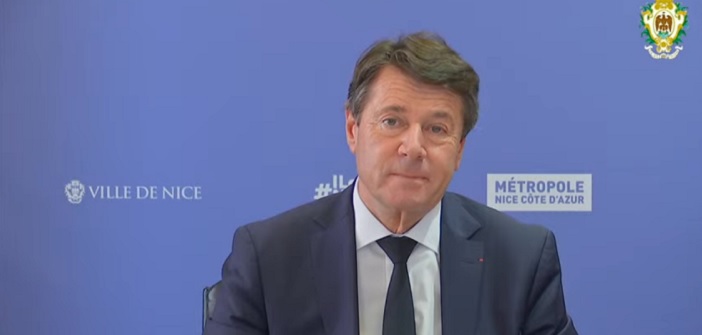After a long interval (the previous session was held on July 30) due to anti-Covid health measures, the Municipal Council resumed its activities even though remotely. The accumulated stock of deliberations (amounting to 157), ranging from strategic files to others of minor importance, required a marathon of more than eight hours for processing.
Firstly, one would note a calm atmosphere, more consensual than conflictual. Credit goes to Christian Estrosi’s approach, who led the proceedings with a relaxed tone, like a true conductor setting the tone and giving the floor to various participants (collaborators or opponents), without tensing up the debates with unnecessary positions. The “solitudo potestatis” must be benevolent …
In any case, the overwhelming majority he enjoys guarantees him favorable votes on the proposed deliberations, so why not allow the opposition to express their reasons (which can only remain in the minority) with tolerance? Or is it the opposition’s awareness of the futility of raising their tone and displaying aggressiveness when the final result is already written? Isn’t it better to argue in a documented manner and leave a trace of one’s remarks rather than engage in verbal scuffles with no outcome?
Unless this virtuous context stems from the physical distancing that a videoconference imposes… don’t bio-sociologists explain that two rats (Rattus norvegicus) in a cage coexist peacefully, while if there are ten, they attack each other?
If this third option is the right one, technology would prove to have a thaumaturgic effect. As in “medio stat virtus”, the solution could be, once normal times return, to keep the dual system alive: each counselor could participate in person or virtually according to their choice.
For some, those who are there just to raise their hand when voting (if you have nothing to say, it’s better to keep silent), this would be a serenade. An armchair at home is more comfortable than a seat in the Town Hall. This opportunity would also be ecological, with fewer commutes and as much efficiency. A “green” inclined municipal council would be fashionable, wouldn’t it?
Health, Ecology, Security, and Many Other Things on the Agenda
How can one ignore a subject that has animated the year 2020 and should at least for a few months remain at the center of attention. At the opening of this Municipal Council, it was about strengthening the health policy in Nice, particularly through the validation of the Government’s vaccination plan. “The health crisis we are going through has shown that the State needed local communities. Only mass vaccination will allow us to resume a more normal life and move towards herd immunity as quickly as possible,” explains the mayor. A pre-registration platform will be set up very soon to better organize, logistically (conditioning), the massive demand from the people of Nice.
Furthermore, the creation of a “Local Health Council” was approved by the majority.
At the Municipal Council of #Nice06 I present the deliberation regarding the creation of the Local Health Council An instance to co-construct a territorial #health strategy with all the actors involved: institutions and city medicine, public and private https://t.co/nDR0QiEKbg pic.twitter.com/xNQjXY2tGi
— Herve CAEL (@hervecael) December 14, 2020
In terms of security, there was talk of adding emergency call terminals which (notably the one located on Avenue Jean Médecin) have helped save several lives during the Notre Dame basilica attack on October 29th. Referred to as “Estrosi’s gadget” by the opposition as the First Deputy Mayor, Anthony Borré, liked to remind, these new terminals (175 + the 16 already in place) will flood the city to enhance police efficiency. A request for a governmental grant was approved for a total amount of €835,200, which is 80% of the total purchase cost.
At the #CMNice I submitted for vote a request for a subsidy from the Interministerial Fund for the Prevention of Delinquency for the deployment of Emergency Call Terminals on #Nice06.
1️⃣7️⃣5️⃣ terminals in ➕ will be installed for the #security of Nice’s residents. pic.twitter.com/bb5Tn4M7JX
— Anthony Borré (@anthony_borre) December 14, 2020
Another key theme of this Municipal Council, ecology and requalification was at the heart of the debate. Firstly, with the approval of the “Nice Zero Plastic” program which fits into the ecological growth idea hammered by Christian Estrosi in recent weeks. “I ensure that in three years there will be no more plastic around, so you won’t have to mobilize to pick it up,” retorted the mayor in response to Hélène Granouillac, municipal councilor of the “ecologist” group who mentioned having collected with a group of thirty volunteers, on March 11th, over 100 50L bags near the Sainte-Marie hospital on the banks of the Paillon.
Plastic is a plague on our environment. #Nice06 has already stood out in the fight against its use, for instance with the central kitchen where it is banned for packaging. At the #CMNice, we are voting on the “Nice zero-plastic” program! pic.twitter.com/iR2frFcT1E
— Christian Estrosi (@cestrosi) December 14, 2020
In terms of ecology, the reduction of greenhouse gases was at the heart of the deliberations on sustainable development. Reducing these gases by 55% within ten years as required by the Paris agreements at the “COP21” and before that by -22% in 2026 is a source of concern for the ecologist group: “it is an enormous challenge that will require strong actions.” This concern was dismissed by Christian Estrosi who explained wanting to combat emissions first and foremost through housing renovation (real estate relaunch) and implementing a 100% decarbonized fleet within the next five years (experimenting with hydrogen bus lines in the coming weeks) as well as favoring soft mobility such as cycling: “after being identified by the French as the city and metropolis making the biggest efforts in France alongside Paris in terms of ecological transition, today I take on the 55% challenge with an acceleration for which we are actively working.”


